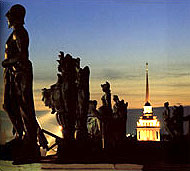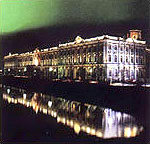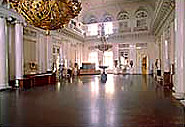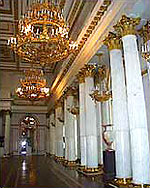
© Love Me
 The largest museum collection in the world is spread throughout six buildings. You enter the Winter Palace from the Neva Embankment. The next building to the east is the Little Hermitage. Further east lies the Old Hermitage (facing the river) and the New Hermitage (facing Palace Square).
The largest museum collection in the world is spread throughout six buildings. You enter the Winter Palace from the Neva Embankment. The next building to the east is the Little Hermitage. Further east lies the Old Hermitage (facing the river) and the New Hermitage (facing Palace Square).
An arched gallery spans the Winter Canal and leads to the Hermitage Theater. Weekend visitors (especially those who come on a Sunday) will have plenty of time to admire the Hermitage from the outside. The line to get in can be long, sometimes requiring up to an hour's wait.
There are literally a zillion things to see in the Hermitage and it is well worth making more than one visit. People who try to see everything in one day will end up staggering out with smoke pouring from their ears, sore legs (from the incredible distances covered) and their minds a-blur of Rembrandts, medieval armored horses and Egyptian mummies.
The overwhelming wealth of the place is all the more enhanced by the incredible splendor of the buildings, inside and out: ornate and regal facades, huge frescoed halls, marble, wood and mosaic floors, statuettes, figurines and antique furniture (scattered about like sacks of potatoes at harvest time); all on such a grand scale that it boggles the mind.
 The Hermitage can be a tricky museum to navigate. A number of factors can render maps and pre-planned routes useless: doors are arbitrarily opened or closed, staircases get roped off, rooms can close for indefinite renovation and paintings are occasionally moved or sent on tour.
The Hermitage can be a tricky museum to navigate. A number of factors can render maps and pre-planned routes useless: doors are arbitrarily opened or closed, staircases get roped off, rooms can close for indefinite renovation and paintings are occasionally moved or sent on tour.
Burned out light bulbs are likewise a periodic nemesis, and the lack of supervisors - whether due to understaffing or a sudden desire to break for lunch (just as hordes of video camera laden tourists rush headlong towards the room in question) - can keep people from seeing certain parts of the exhibition.
As a general rule, when things must be closed, the museum authorities make an effort to keep the most popular stuff (European art from the 15th to the 20th century) open at the expense of the more obscure exhibits (the burial mounds of Solokha and Chertomlyk).
The surest way to find anything in particular is to ask one of the supervisors who sit and watch the rooms. They don't speak English, but saying the name of the artist will be sufficient to have him or her point you in the right direction.
 The Hermitage usually houses several concurrent temporary exhibitions. An announcement board to the left of the entrance on the way to the Main Staircase lists these in Russian.
Major exhibitions may require an even more exorbitant fee (which then entitles you to see the rest of the museum), but usually the standard admission is good.
The Hermitage usually houses several concurrent temporary exhibitions. An announcement board to the left of the entrance on the way to the Main Staircase lists these in Russian.
Major exhibitions may require an even more exorbitant fee (which then entitles you to see the rest of the museum), but usually the standard admission is good.
Larger temporary exhibitions are held in the Concert Hall and the Ballroom (big rooms on the second floor opposite the Main Staircase) and usually the Alexandrovsky Hall and the foyer of the Hermitage Theater have something interesting on display.
 A special exhibition entitled "Treasures of the Russian Imperial Court" can be accessed only with a group excursion lead by a guide provided by the Hermitage.
A special exhibition entitled "Treasures of the Russian Imperial Court" can be accessed only with a group excursion lead by a guide provided by the Hermitage.
Separate tickets must be purchased at the excursion bureau (located up a short flight of stairs to the right of the ticket booths) and then you'll need to wait at the base of the Main Staircase for the guide.
Currently the bulk of this exhibition is hidden away while the first floor rooms holding them undergo renovation. However, the items that remain on view are still of interest: intricate and garish snuff boxes, jewelry and other knick-knacks (studded with precious gems and heavy on the gold).
The museum has the world's largest collection of precious Scythian art. Part of this collection is, unfortunately, not on display.
Finally, a recently opened exhibition called "Peter I's Winter Palace" shows rooms belonging to Peter and Catherine I unearthed during renovation of the Hermitage Theater.
Entrance is only as part of a group. You'll need to purchase tickets at the excursion bureau.